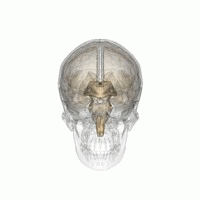
Image courtesy of renjith krishnan at FreeDigitalPhotos.net

Endocrine System
The endocrine system is a regulatory system (like the nervous system) that affects bodily activities by releasing chemical messengers (hormones) into the bloodstream.
Hormones are special chemical messengers in the body that are created in the endocrine glands.
These messengers control most major bodily functions, from simple basic needs like hunger to complex systems like reproduction, and even the emotions and mood.
Hormones are formed in the endocrine glands which are scattered throughout the body.

Pituitary Gland
-
A pea-sized gland located at the base of the brain. It is considered the most important gland in the body (master gland)
-
It is an important link between the nervous and endocrine systems and releases many hormones which affect growth, sexual development, metabolism and human reproduction
Hypothalamus
-
The hypothalamus is a tiny cluster of brain cells, just above the pituitary gland
-
Plays an important role in homeostasis
The Pineal Gland
-
Tiny gland deep in the brain
-
Produces the hormone melatonin. Melatonin plays a key role in the sleep/wake cycle and the body’s response to sunlight.

Image generated by Life Science Databases(LSDB). - from Anatomography, website maintained by Life Science Databases(LSDB).

Image byBlausen.com staff. "Blausen gallery 2014". Wikiversity Journal of Medicine. DOI:10.15347/wjm/2014.010. ISSN 20018762. - Own work, CC BY 3.0, https://commons.wikimedia.org/w/index.php?curid=31118598

Image generated by Life Science Databases(LSDB). - from Anatomography, website maintained by Life Science Databases(LSDB).
The Thyroid Gland
-
Located in the neck, either side of the larynx
-
Produces thyroxine which increases metabolic reactions associated with energy production, growth and development
-
Produces hormones (calcitonin) responsible for the transfer of the mineral calcium from the blood into the bones
Parathyroid gland
-
Consists of four small oval bodies located on either side of, and on, the front of the thyroid gland
-
These glands control the level of calcium in the blood. If calcium is too low in the blood it removes it from the bones
The Adrenal glands
-
Located on the top of the kidneys
-
Release adrenalin into the bloodstream during exercise/stress which increases metabolic rate, heart rate, breathing rate and blood flow to the muscles
-
Also releases steroids which control mineral levels (salt, potassium), and helps to raise blood sugar levels
Islets of Langerhans (pancreas)
-
Located in the pancreas
-
Produce insulin to lower blood sugar levels and glucagon to raise blood sugar levels
Testes and Ovaries
-
Also part of the reproductive system
-
Ovaries produce the hormones oestrogen and progesterone
-
Testes produce testosterone



Image by Blausen.com staff. "Blausen gallery 2014". Wikiversity Journal of Medicine. DOI:10.15347/wjm/2014.010. ISSN 20018762. (Own work) [CC BY 3.0 (
